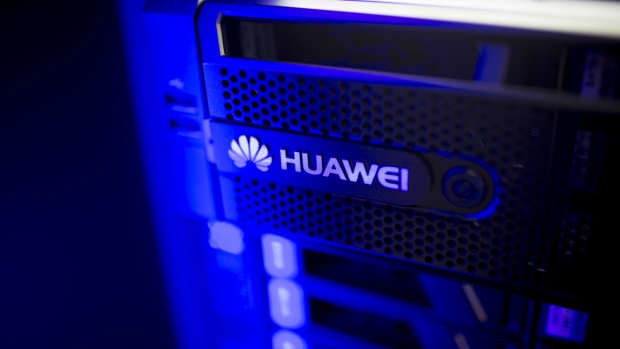Dec 7, 2018
Trump risks backlash from Congress with handling of Huawei case
, Bloomberg News

(Bloomberg) -- President Donald Trump could soon be facing mounting pressure from U.S. lawmakers to take action against China’s Huawei Technologies Co., just as he is trying to de-escalate trade tensions between the world’s two largest economies.
After Huawei Chief Financial Officer Meng Wanzhou was arrested in Vancouver Dec. 1 at the behest of U.S. authorities for allegedly violating American sanctions on selling technology to Iran, Democrats and Republicans have quickly called on Trump to hold the Chinese company accountable.
The dilemma Trump could face on Huawei is partly of his own making. In May, his Commerce Secretary Wilbur Ross went after ZTE Corp., a rival Chinese telecoms equipment maker, with charges of violating sanctions agreements by selling U.S. technology to North Korea and Iran. When the administration eased the punishment at the request of Chinese President Xi Jinping, a bipartisan group of lawmakers criticized Trump for going soft on China.
“If @Huawei has been helping violate US sanctions by transferring US technology to #Iran they should be barred from operating in the US or from purchasing US technology,” Senator Marco Rubio of Florida said Thursday on Twitter.
National Security
Senator Mark Warner, a Virginia Democrat, added to the criticism on Thursday “It has been clear for some time that Huawei, like ZTE, poses a threat to our national security.”
“It’s my hope that the Trump Administration will hold Huawei fully accountable for breaking sanctions law, as it failed to do in the case of ZTE.”
A China-based ZTE representative didn’t immediately respond to a request for comment outside regular business hours. A spokesman for Huawei didn’t have an immediate comment.
Markets quickly reacted to the news of Meng’s arrest, stoking renewed fears of a further escalation in the trade war. Meng is being charged with conspiracy to defraud banks, a lawyer representing Canada said during a bail hearing on Friday. A White House official said that Trump was not aware of the arrest in advance, distancing the president from the provocative move.
Trump and Xi agreed in Buenos Aires on Dec. 1, the same day as Meng’s arrest, to hold off on increasing tariffs for 90 days. In the three-month negotiating phase, the two sides hope to accomplish solutions on intellectual property theft and China committed to increase purchases of U.S. soybeans and energy products.
ZTE dilemma
Huawei has long been a concern for the U.S. government and lawmakers who believe Chinese technology companies are avenues for surveillance by the country’s intelligence agencies.
Now Trump is in a tough spot to navigate domestic political pressure with successful trade negotiations, said Derek Scissors, China expert at the American Enterprise Institute.
“Fining Huawei or requiring personnel changes accomplishes nothing. If he lets Huawei off the hook, it may look like the ZTE fiasco, where he canceled tough action because ‘too many jobs in China lost,”’ Scissors said. “But serious steps against Huawei will effectively end this round of trade talks because the company -- not its officials -- is so important to the Communist Party.”
‘Separate tracks’
It’s not yet clear what, if any, action the U.S. government is planning to take against Huawei, but analysts and former government officials say the sanctions lawmakers are asking for could jeopardize the ongoing trade negotiations.
“Beijing is increasingly realizing that the walls are higher and the threat of another ZTE is just around the corner, and at some point the reaction to this will be strong, and potentially explosive,” said Paul Triolo, who focuses on global technology issues at Eurasia Group.
White House economic adviser Larry Kudlow told Bloomberg TV on Friday that the arrest and the trade talks are “two separate tracks.” He added that the negotiations “have a lot of momentum” and that he does not believe they will be interrupted.
The Chinese government, publicly at least, is keeping the issues separate. But the arrest has triggered a debate in China over whether to carry on with trade talks or link the two issues and retaliate. Government officials are split about how to react to the arrest and what the pros and cons of counter measures against U.S. companies could be.
Senator Chris Van Hollen, a Maryland Democrat, wrote legislation with Rubio earlier this year that would automatically reinstate the sales ban for ZTE if it’s found to break the deal it cut with Commerce.
“Huawei and ZTE are two sides of the same coin -- Chinese telecommunications companies that represent a risk to American national security,” Van Hollen said on Thursday on Twitter. “We need a comprehensive plan to hold China and their state-sponsored entities accountable for gross violations of our laws.”
--With assistance from Mark Gurman and Selina Wang





